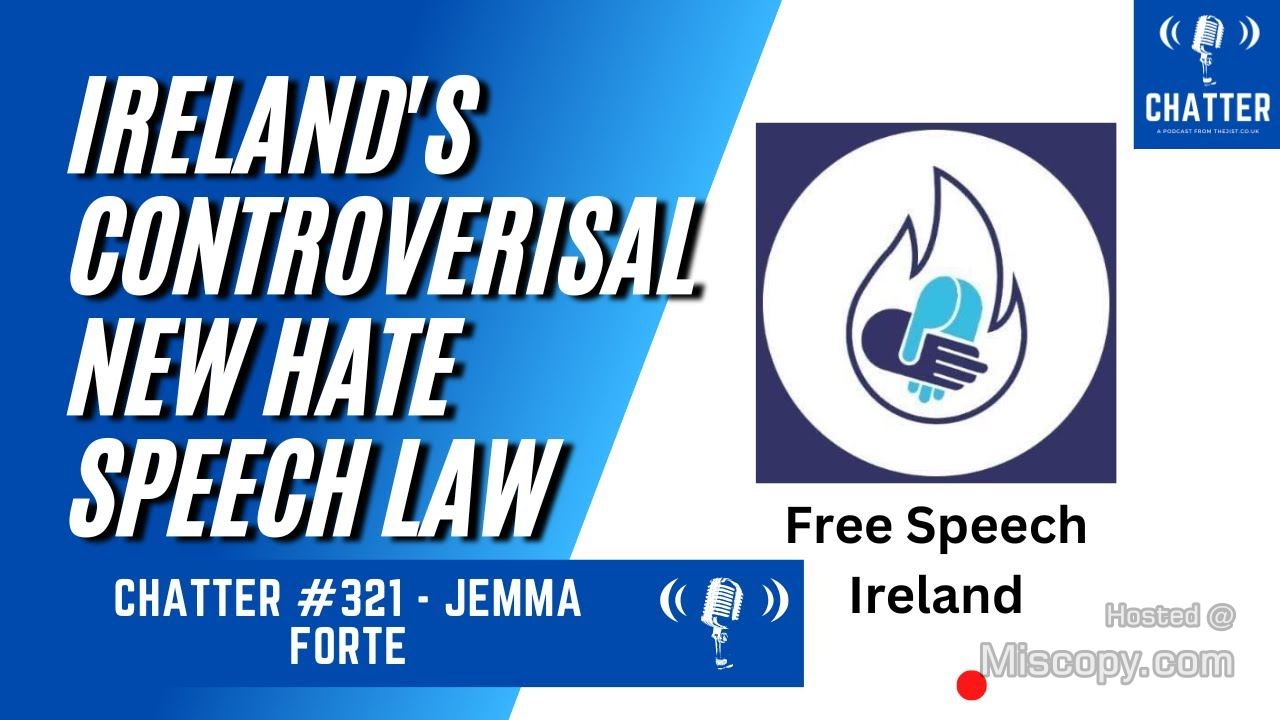Sarah Hardiman of Free Speech Ireland discusses the controversial new hate speech law in Ireland, which is recommend by the EU and could set a dangerous precedent for speech restrictions online.
Hardiman notes that the law is overly broad and could potentially criminalize individuals for possessing material deemed hateful, even if they have no intention of sharing it. Despite opposition from her advocacy group and the public, the law is likely to pass due to a lack of political opposition, leading Hardiman to urge people to support their cause online and raise awareness about the potential implications of the law on free speech.
00:00:00
In this section, Sarah Hardiman from Free Speech Ireland discusses the controversial new hate speech law in Ireland, proposed by Minister for Justice Helen McEntee, but actually recommended by the EU. Hardiman explains that the reason for the EU’s strong interest in Ireland’s speech laws is due to the country’s importance in the bustling tech industry. With Dublin hosting the headquarters of big tech companies like Twitter and Facebook, the Irish legal system is becoming an important regulator for these companies. Hardiman warns that this hate speech legislation could set a dangerous precedent for restricting speech online, not just in Ireland or Europe, but globally. She also notes that the Irish people have not had a say in this legislation, and it is terrifying from that perspective.
00:05:00
In this section, Sarah Hardiman discusses the concept of free speech in Ireland and how it is qualified rather than absolute, with restrictions in place to protect public order and morality. She notes that the 1989 Prohibition of Incitement to Hatred Act is fit for purpose and prevents individuals from calling for violence against certain groups. However, the new Hate Offences Bill of 2022 is changing the definitions of hate speech and safety, creating confusion around what is considered offensive and what poses a real threat. Hardiman notes that while protection from incitement to violence is necessary, the new legislation is also restricting humor and free expression online.
00:10:00
In this section, Sarah Hardiman discusses the specifics of Ireland’s new hate speech law. She explains that the Irish Times article on the law fails to mention the section that makes it possible to criminalize individuals for possessing material that is deemed hateful. Hardiman breaks down Section 10 of the law, which essentially states that anyone who prepares or possesses material likely to incite violence or hatred against a group with protected characteristics is guilty of an offense. She argues that this new law could lead to a dangerous suppression of free speech and legitimate discussions about sensitive topics. Hardiman cites an example in the UK where a woman was visited by police after having an online disagreement with a transgender male on Twitter, which highlights the conflation of physical violence with online interaction.
00:15:00
In this section of the video, the speakers discuss how the new hate speech law in Ireland, section two of the bill, necessitates good faith acting for individuals commenting on topics such as genocide, without room for concern if everyone is acting in good faith. However, there remains a worry on how the law or norms can be exploited to the gain of an individual or cause, rather than the people who operate in good faith. Furthermore, the law might not permit historical and academic discourse, restricting democratic and free speech, leading to the question of whether Ireland is still a democratic and free nation.
00:20:00
In this section, Sarah Hardiman discusses how the new hate speech law in Ireland is not about artwork or academia, but rather it is a way to get people to conform to a set of thoughts. The new legislation is about making people think twice about their thoughts and by default, controlling their speech, making them afraid to voice certain opinions. Sarah mentions a case where a woman was fined for posting a lyric on her social media account. The current politicians may promise not to exploit the law, but there is no guarantee the future ones won’t. The dangerous thing about this law is that it has already started to silence people in Ireland since the government tries to dismiss any criticism of the migrant crisis as racism.
00:25:00
In this section, the speaker highlights the unpopularity of the hate speech legislation in Ireland with 73% of people opposing the bill proposed. A national referendum on blasphemy laws was also defeated in 2018 with a 65% vote. Despite the public’s opposition to speech restrictions, members of Parliament are ignoring the citizens’ views and moving forward with the legislation. The speaker argues that the government is trying to use this legislation to instill fear and compliance in the people, which she describes as tyranny. The speaker also mentions the power of NGO groups in Ireland and how they can influence legislation.
00:30:00
In this section, Sarah Hardiman discusses the changing societal views in Ireland regarding online life and how it could affect public perception of the controversial new hate speech law currently being debated. She notes that older generations may see the law as an infringement on their freedoms, but younger people who have grown up online may view it as necessary protection. Hardiman also criticizes the journalist union in Ireland for their lack of vocal opposition to the new law, considering their past advocacy for free speech and the right to free expression. Despite opposition from her advocacy group, Hardiman believes the law will pass and become secure in the future.
00:35:00
In this section, the speaker discusses the failure of journalists to protect free speech and points out that journalism has shifted from challenging powerful institutions to promoting a particular narrative. The controversial new hate speech law recently passed in Ireland by a vote of 110 to 14, with only a few members on the Left voting against it. The speaker notes that it is a reflection of the broken system and the lack of viable opposition. The speaker also expresses concern that the new law may have been handed down from the EU, and there is a lack of viable alternatives in the political system.
00:40:00
In this section, Sarah Hardiman discusses how Ireland’s new hate speech law can potentially convict people for possessing hateful or offensive content even if they have no intention of sharing it. Hardiman compares this to the conviction of possessing child porn. She also expresses concern over the policing of such content, questioning whether simply scrolling through Twitter and viewing potentially hateful content warrants a conviction. Hardiman believes the law will likely pass the Senate due to a lack of political opposition, but there is still a window of opportunity for opposition before the president signs it into law. She urges people, particularly those who use social media within Europe, to be aware of the potential implications of this law.
00:45:00
In this section, Sarah Hardiman of Free Speech Ireland urges people to support their cause online by following them on social media and sharing their content. She explains that major social media outlets, including Google, are based in Dublin and are governed by the Irish system, so it is crucial to raise awareness about the controversial new hate speech law in Ireland. Hardiman also notes that while they are open to various options in the future, including legal avenues, challenging the law will take a lot of effort. In the meantime, they are a group of people who are hungry to do whatever they can to challenge it as successfully as possible.





Leave a Reply